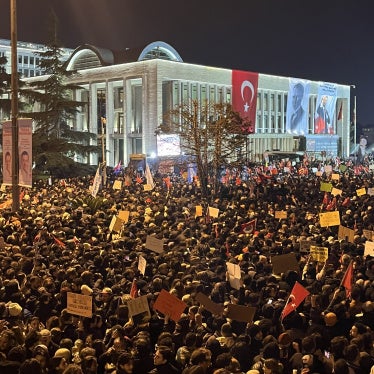European leaders who will meet with Yugoslavia´s new president Vojislav Kostunica should send the message that human rights must be at the top of his agenda, said Human Rights Watch.
This is an important time for European leaders to discuss with President Kostunica a fresh vision for human rights and democracy in the new Yugoslavia," said Lotte Leicht, Brussels office director of Human Rights Watch. "Key issues range from transferring indicted war crime suspects to the International Criminal Court (ICTY) in the Hague to re-establishing the independence of the judiciary. They are critical to restoring the rule of law to a country that for so many years languished under authoritarianism."
Monday the E.U. dropped a subtantial part of its sanctions against the Federal Republic of Yugoslavia, and especially Serbia. These sanctions were imposed over the past years in response to war crimes and other violations of international human rights and humanitarian law throughout the former Yugoslavia for which the Milosevic regime was held responsible.
"The E.U. is of course keen to see the Federal Republic of Yugoslavia reintegrated into European cooperation," said Lotte Leicht, "But part of such re-integration is that the new federal and Serbian governments in Belgrade-when they are formed-will eventually have to cooperate with the war crimes tribunal in the Hague. It's an indispensable part of the rule of law package for Europe."
According to Rachel Denber, Acting Director of Human Rights Watch´s Europe and Central Asia division, some of the most important human rights issues on the horizon include:
the release of political prisoners;
reinstating judges, university professors, and others who were fired for political reasons;
restoring the independence of the judiciary, and bringing to justice police and security officials responsible for serious abuses during the Milosevic era.
Serbian human rights groups estimate that some 850 Kosovo Albanians who were arrested during last year's NATO war are currently serving prison sentences in Serbia. Most sentences resulted from unfair trials lacking evidence against the accused.
Today a Serbian court will re-hear the cases of several of these prisoners, including Flora Brovina, chair of the League of Albanian Women in Kosovo. Brovina, a poet and physician, was sentenced in November 1999 by a district court in Nis to twelve years in prison on absurd charges of conspiracy to commit "hostile activity" and terrorism.
President Kostunica is opposed to the war crimes tribunal in the Hague and has said he does not intend to hand over former Yugoslav president Slobodan Milosevic and other indicted persons. Lotte Leicht said that the E.U. should make clear that non-cooperation with the tribunal is unacceptable, and that cooperation would be a condition for direct loans and credits. "The E.U. and other institutions should treat Yugoslavia's cooperation with the tribunal on the same terms that it treated Croatia and Bosnia," said Lotte Leicht. Last year the E.U. governments postponed a decision about a consultative task force on contractual relations with Croatia due to limited cooperation with the tribunal.







